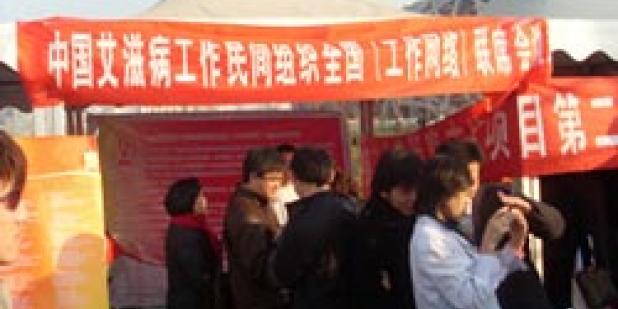Join us for a free one-day workshop for educators at the Japanese American National Museum, hosted by the USC U.S.-China Institute and the National Consortium for Teaching about Asia. This workshop will include a guided tour of the beloved exhibition Common Ground: The Heart of Community, slated to close permanently in January 2025. Following the tour, learn strategies for engaging students in the primary source artifacts, images, and documents found in JANM’s vast collection and discover classroom-ready resources to support teaching and learning about the Japanese American experience.
HIV/AIDS NGOs in China and Their Relationship with the Government
UCLA's Center for Chinese Studies presents a talk by Wan Yanhai.
Where

Date: Friday, October 16, 2009
Time: 4:00 PM - 5:30 PM
In the past decade, grassroots HIV/AIDS NGOs in China have developed rapidly. Most of these NGOs -- which focus on HIV/AIDS prevention, care, and advocacy -- have been organized by people infected or affected by HIV/AIDS as well as people who are concerned about those with HIV/AIDS. There are hundreds of such grassroots NGOs working on HIV/AIDS in China, run by people with HIV/AIDS, members of the gay community, youth, members of religious organizations, hemophiliacs, drug users, sex workers, migrants, and rights advocates. These groups have become active nationally. The majority of them are not registered with the government, although some are registered as enterprises. Different NGO networks have been established for communication, advocacy, land fund-raising. The government seeks to control funding, including funding from international donors. NGOs constantly face harassment. The government and donors do not provide financial support for NGOs' staff salaries and office rent, and community outreach workers do not have insurance for potential injuries. NGOs have been used by the government for various large projects, such as the China-Gates AIDS Project and Global Fund projects. The speaker will speak about the general development of AIDS NGOs in China and analyze their relationship with the government, especially with health departments.
Commenting on Wan Yanhai's talk will be Roger Detels, Professor of Epidemiology at UCLA.
Wan Yanhai (a graduate of the School of Public Health of the Shanghai Medical University, 1988) is one of the most prominent leaders in the global campaign against HIV/AIDS. He launched China's first HIV/AIDS counseling hotline in 1992 while working for China's National Health Education Institute. In 1994, he founded Beijing Aizhi Action Project, an NGO that uses health education, research, publishing, and conferences to confront the growing HIV/AIDS crisis in China. Central to Wan's message is his belief that widespread social prejudice in China against gays, lesbians, bisexuals, and intravenous drug users exacerbates the suffering of HIV-positive individuals and undermines efforts to combat the spread of the disease.
Featured Articles
Please join us for the Grad Mixer! Hosted by USC Annenberg Office of International Affairs, Enjoy food, drink and conversation with fellow students across USC Annenberg. Graduate students from any field are welcome to join, so it is a great opportunity to meet fellow students with IR/foreign policy-related research topics and interests.
RSVP link: https://forms.gle/1zer188RE9dCS6Ho6
Events
Hosted by USC Annenberg Office of International Affairs, enjoy food, drink and conversation with fellow international students.
Join us for an in-person conversation on Thursday, November 7th at 4pm with author David M. Lampton as he discusses his new book, Living U.S.-China Relations: From Cold War to Cold War. The book examines the history of U.S.-China relations across eight U.S. presidential administrations.




